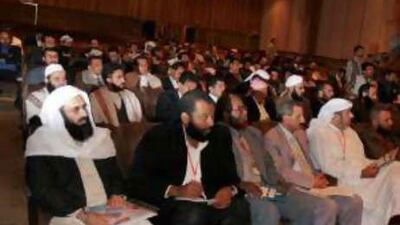SANA'A // More than two years ago, with an increasing number of western media outlets attracting viewers and readers in the Middle East, the Islamic Press League was born. True to its name, the association, which counts 30 media organisations - including Al Qudos magazine in Egypt, Al Bayan magazine in Saudi Arabia, Al Muntada magazine in Yemen and Al Sabeel newspaper in Jordan - as members, aims to represent an Islamic viewpoint in its work.
"This is an era of media and influence. The present Arab media influenced by the West is trying to control the Muslim mindset and our ethical values. This is why we have realised the urgent need for an Islamic press to adopt our issues based on our Islamic morals and values," said Sheikh Ahmed bin Abdulrehman Assawayan, the head of IPL, during the organisation's third conference in the Yemeni capital last week.
The league's aim is to promote the Islamic press and improve its performance in serving Islamic issues as well as encouraging studies that serve the mission of the Muslim press. "We are proud of having Islam and its teachings as a reference for our journalistic work. I am not happy with the performance of the other Arab media, which promotes the western culture as its background. This is against Islam," Sheikh Assawayan said during the conference, which drew participants from Egypt, Sudan, Saudi Arabia, Bahrain, Kuwait, Iraq, Lebanon, Morocco and Yemen.
Any media organisation with religious or political leanings is bound to have detractors, and Sheikh Assawayan's group is no different. Saeed Thabet, the deputy chairman of the Yemeni Journalists Syndicate, said he was against the categorisation of Islamic and non-Islamic media. "The journalism that has Islamic background should be open and human at large as Islam is not for a specific group of people; it is for all humanity," he said. "This media takes away the human perspective of Islam.
"There are several media outlets all over the Arab world which do not put on the Islamic label. However, they have been doing an excellent job in digging into the people's concerns and reporting the suffering of the people here and there. Their job in reporting the pains of the Muslims is much better than those media which call itself Islamic." He said the label "Islamic press" was divisive. "This is a provoking motto, particularly in societies where people already decided about their Islamic identity.
"Such categorisation does not serve the people behind such a league. It rather narrows its objectives and scope." But Sheikh Assawayan, who also runs Al Bayan magazine said Muslim journalists "do suffer from marginalisation of the right thought, marginalisation of Islamic causes; we have economic, social and intellectual problems that need to be reported in a professional [manner] and here comes the role of the Islamic press to report on these issues away from the shallowness of the Arab media".
He added: "Our league has an active presence in several Arab countries, and this increases our responsibility in salvaging the nation from the current western immoral flood sweeping our Arab world. We have to have an alternative. We cannot face projects like CNN or Fox News only with alternative projects. We need an Islamic media that preserves the nation's Islamic and cultural identity." The league's closing statement at the conference emphasised "the foreseen role of the Arab and Islamic media in revealing plots targeting Iraq and showing the oppression suffered by the surrounded Palestinians".
Sheikh Assawayan said: "While our people in Gaza are dying of hunger due to the siege imposed by Israel, some Arab TVs are broadcasting a fashion show in Ramallah. This is not an abuse to the feelings of the Palestinian people but to all of us as Muslims," . During the three-day conference the league also focused on the fate of the al Aqsa mosque in Jerusalem's Old City. "We will launch the initiative of 'media professionals for al Aqsa' in order to thicken our reporting on the dangers this mosque is facing due to the Zionist digging beneath the mosque as well as the plight of the people in Gaza," Sheikh Assawayan said.
Delegates also devoted time to professional workshops. "Our journalists must be professionally qualified in order to influence; they must also have mastered Arabic language. But the most important issue I recommend here is that we should in our media outlets encourage women enrolment in all our activities," said Adnan BuMuttee of Bahrain. mqadhi@thenational.ae

